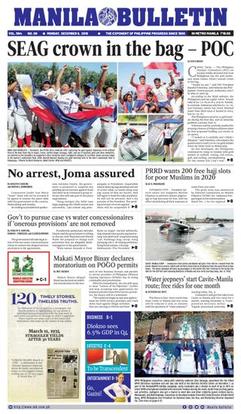Related Research Articles
The Coalition Against the Marcos Dictatorship was a North America-based antiimperialist organization that was at the center of the international movement opposing the dictatorship of Philippine President Ferdinand Marcos from the 1970s.

Maximo Villaflor Soliven was a Filipino journalist and newspaper publisher. In a career spanning six decades, he founded the Philippine Star and served as its publisher until his death.

The Manila Bulletin is the Philippines' largest English language broadsheet newspaper by circulation. Founded in 1900, it is the second oldest extant newspaper published in the Philippines and the second oldest extant English newspaper in the Far East. It bills itself as "The Nation's Leading Newspaper", which is its official slogan.
Francisco Flores Trinidad, Jr., better known by his pen name "Corky", was a Filipino-American editorial cartoonist and comics artist. Born in Manila, he was known for his editorial cartoons for the Honolulu Star-Bulletin since 1969, and especially for his Vietnam War comic strip Nguyen Charlie.

Eugenia "Eggie" Apostol is a Filipino publisher who played pivotal roles in the peaceful overthrow of two Philippine presidents: Ferdinand Marcos in 1986 and Joseph Estrada in 2001. She was awarded the 2006 Ramon Magsaysay Award for Journalism, Literature & Creative Communication Arts.

The Philippine Star is an English-language newspaper in the Philippines and the flagship brand of the Philstar Media Group. First published on July 28, 1986, by veteran journalists Betty Go-Belmonte, Max Soliven and Art Borjal, it is one of several Philippine newspapers founded after the 1986 People Power Revolution.

Letty Jimenez-Magsanoc was a Filipino journalist and editor, notable for her role in overthrowing the dictatorship of Ferdinand Marcos. She was an icon of democracy. Magsanoc was editor of the crusading weekly opposition tabloid Mr & Ms Special Edition. She was editor in chief of the Philippine Daily Inquirer.
Teodoro "Teddy Boy" Montelibano Locsin was a journalist, publisher of The Philippines Free Press Magazine and father of former Secretary of Foreign Affairs Teodoro Locsin Jr.

The Bantayog ng mga Bayani, sometimes simply referred to as the Bantayog, is a monument, museum, and historical research center in Quezon City, Philippines, which honors the martyrs and heroes of the struggle against the dictatorship of former President Ferdinand Marcos.

Lourdes "Chit" Panganiban Estella-Simbulan was a Filipino journalist and professor, known for her critical writings on government repression, abuse, corruption and human rights violations.
Antonio Maria "Tony" Onrubia Nieva was a Filipino journalist, union organizer, and activist. He worked to defend press freedom and the rights of workers, and campaigned to end authoritarian rule in the Philippines. He led the National Press Club as president and founded the National Union of Journalists of the Philippines. He was secretary general of the International Organization of Journalists based in Prague, Czech Republic, from 1995 up to the time of his death in 1997. His name is on the Bantayog ng mga Bayani Wall of Remembrance, for his contributions to the fight against injustices of the dictatorship under President Ferdinand E. Marcos.

At 7:15 p.m. on September 23, 1972, President Ferdinand Marcos announced on television that he had placed the entirety of the Philippines under martial law. This marked the beginning of a fourteen-year period of one-man rule that would effectively last until Marcos was exiled from the country on February 25, 1986. Even though the formal document proclaiming martial law—Proclamation No. 1081, which was dated September 21, 1972—was formally lifted on January 17, 1981, Marcos retained essentially all of his powers as dictator until he was ousted.

Napoleon "Nap" Genson Rama, PLH was a Filipino Visayan lawyer, journalist, and writer in English and Spanish from Cebu, Philippines. He was the Vice President of the 1971 Constitutional Convention and the Floor Leader of the 1986 Constitutional Commission. In 2011, he was awarded the Philippine Legion of Honor, the country's highest recognition, with the rank of Grand Commander on the 25th anniversary of the EDSA 1 Revolution by President Benigno S. Aquino III.
Antonio De Leon Zumel II, also known by his nicknames Tony, Manong, Ching and Antumel, was a Filipino journalist, activist, and ;eftist revolutionary. He was two-time President of the National Press Club of the Philippines before going underground in 1972 at the start of the Marcos dictatorship. In 1990, he was elected Chairperson of the National Democratic Front of the Philippines in absentia, and was a senior adviser to the NDFP negotiating panel from 1994 until his death in 2001.
Felicita "Fely" Villasin was a Philippine-born activist most notable in her part in the anti-Marcos movement and domestic workers' rights advocacy.
Carmencita "Ging" Hernandez was a Philippine-born activist most notable in her part in the anti-Marcos movement and women's rights movement in Canada.
Maria Ceres P. Doyo is a Filipino journalist, author, human rights activist, and feminist best known as a columnist and staff writer for the Philippine Daily Inquirer, for her numerous books on Philippine journalism, and for the historical impact of her investigative reports during the martial law under Ferdinand Marcos.

Primitivo "Tibo" Medrana Mijares was a Filipino journalist, author, war hero, and former press censor and propagandist. He was a reporter of the Philippines Daily Express, a newspaper in circulation during the regime of former Philippine President Ferdinand Marcos.
Journalism during the Marcos dictatorship in the Philippines—a fourteen year period between the declaration of Martial Law in September 1972 until the People Power Revolution in February 1986—was heavily restricted under the dictatorial rule of President Ferdinand Marcos in order to suppress political opposition and prevent criticism of his administration.
Amando Ermitano Doronila was a Filipino journalist, writer and newspaper publisher who covered Philippine politics from the 1960s to the early decades of the 21st century and was imprisoned and exiled by the Martial Law regime of President Ferdinand Marcos.
References
- ↑ "Martial Law". GMA News Online. Archived from the original on February 17, 2009. Retrieved June 7, 2018.
- ↑ "Balita.ca" . Retrieved October 5, 2023.
- ↑ "Our Low Profile Eddie" . Retrieved October 5, 2023.
- ↑ "Filipino Pre-martial Law Journalist Ruben J. Cusipag, 74, Dies in Canada". Mabuhay Radio. Retrieved June 7, 2018.